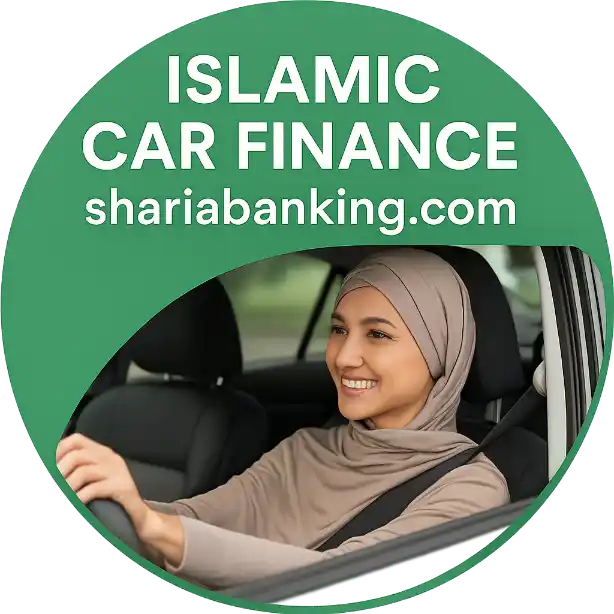
WHAT IS A SHARIA COMPLIANT AUTO LOAN WITH NO INTEREST ?
An Islamic car loan without interest (Riba) is a Shariah-compliant financing arrangement that allows a customer to purchase a vehicle without paying conventional interest; instead of borrowing money and repaying it with added interest, the Islamic bank or financial institution uses permissible contracts such as Murabaha (cost-plus sale).
In a Murabaha car loan, the bank purchases the car that the customer wants and then sells it back to the customer at an agreed profit margin; the total price (car cost + profit) is disclosed upfront, and the customer repays in fixed installments.
The halal car loan is this way sharia compliant as the bank’s profit is considered halal because it comes from a trade transaction, not from lending money at interest.
How can I be eligible to obtain an Islamic car loan without Riba ?
Eligibility for an Islamic car loan without Riba works very much like a conventional car loan, but with some additional conditions to ensure Shariah compliance. Here are the key factors:
1. General Financial Requirements
- You need to show a stable source of income (employment or business) to prove you can afford the monthly installments.
- Lenders will check your credit history (in countries where credit scoring is common) to assess your repayment reliability.
- Most banks set minimum and maximum age limits (e.g., 21–65 years).
2. Shariah Compliance Conditions
- The loan must be tied to a real asset — in this case, the car. The bank will either buy the car on your behalf (Murabaha) or own and lease it to you (Ijara).
- You cannot use the financing for haram purposes (e.g., vehicles intended for unlawful businesses like transporting alcohol).
- All fees and profit margins must be disclosed upfront; no hidden interest or compounding charges are allowed.
HOW DOES AN ISLAMIC CAR LOAN WORKS IN PRACTICE ?
The key difference to classical car loans, is that the bank doesn’t simply “lend you money” — instead, it buys the car first and then transfers it to you under a Shariah-compliant contract.
1. Application & Approval
- You apply for financing at an Islamic bank or Islamic window of a conventional bank.
- The bank checks your income, creditworthiness, and documents (ID, proof of income, car quotation, etc.).
- If approved, the bank agrees to finance the car through a Shariah-compliant structure, usually Murabaha (cost-plus sale).
2. Bank Purchases the Car
- Instead of giving you cash, the bank buys the car directly from the dealer on your behalf.
- This step is crucial because Shariah requires the bank to take ownership and risk of the asset before transferring it to you.
3. Sale to You
- Murabaha (cost-plus sale):
- The bank sells you the car at the purchase price + a profit margin.
- The total price is fixed and disclosed upfront, repayable in installments over an agreed period.
- Example: If the car costs $20,000, the bank may sell it to you for $22,000 payable over 5 years — no compounding interest, just a clear markup.
4. Repayment & Ownership Transfer
- You make monthly payments (either installments in Murabaha or rent in Ijara).
- In Murabaha, ownership transfers to you immediately, but the bank has the right to repossess the car if you default.
WHICH BANKS AND LENDERS MAKE SHARIA COMPLIANT AUTO LOANS AVAILABLE IN THE USA, THE UK, CANADA, SOUTH-AFRICA AND INDIA ?
Here’s an updated list of known banks and lenders offering Sharia-compliant (Islamic) auto loan products in the USA, UK, Canada, South Africa, and India, based on available sources:
United States
- UIF (Universal Islamic Finance) offers vehicle financing with down payments from 5–10%, structured under Sharia advisory approval. myuif.com
- Jafari No-Interest Credit Union provides no-interest loans, including auto-loan refinancing options, which align with Islamic finance principles. jafaricu.com
- Stearns Salaam Banking (division of Stearns Bank) offers faith-based financing options approved by a Sharia supervisory board—though primarily for mortgages, it’s indicative of institutions open to asset-backed Sharia-compliant products. stearnsbank.com
- LFARIBA / La Riba Finance and Guidance Residential: mentioned as US-based providers offering auto financing using Islamic compliance structures (e.g., Ijara or Murabaha), though more detail is limited.
United Kingdom
- Al Rayan Bank, Gatehouse Bank, and QIB UK (Qatar Islamic Bank UK) offer Sharia-compliant car financing, typically using models like Murabaha or Ijara.
- Ayan Capital is expanding into halal vehicle financing in the UK market.
Canada
- Islamic Finance House Canada offers 100% Sharia-compliant car financing, following models like Ijara or Murabaha.
- Manzil (a leading Canadian Islamic finance provider) also offers halal car financing among its Sharia-compliant services.
South Africa
- No specific auto loan providers were found. However, Sanlam Group is a major financial institution with Islamic services across Africa (not explicitly including car finance). More specialized providers might exist but weren’t listed in the accessible results.
India
- While broader Islamic finance options are limited in India, Revfin offers EV and vehicle financing via non-bank financial services—but there’s no clear indication of Sharia compliance.
- No explicit Indian Sharia-compliant auto lenders were identified in the sources.